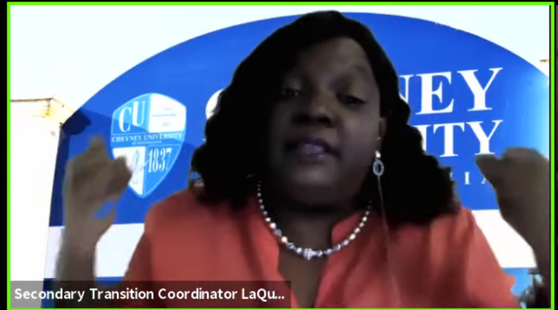
The drop-off of available services after high school for students with intellectual and/or developmental disabilities (IDD) can be so dramatic that it has even earned its own nickname, the “service cliff.”
Drexel University’s A.J. Drexel Autism Institute reported key findings in a 2015 report about the transition experiences of youth with autism:
- Only 58% of youth with autism had a transition plan by the required age (per federal law) according to their special education teachers. (NAIR, 2015)
- More than 60% of young adults on the autism spectrum do not transition into work or continued education within the first two years after leaving high school. (NAIR, 2015)
- Those from lower income households or who have lower conversational abilities are far more likely to experience disconnections from work and education following the transition from high school. (NAIR, 2015)
To help students navigate their futures after high school, The Arc of Philadelphia teamed up with the School District of Philadelphia on April 14th to present the 2021 Youth Leadership Conference.
Broadcast on YouTube to classrooms and students across Philadelphia, the conference welcomed an array of speakers to discuss post-high school transition, hosted by the Executive Director of The Arc of Philadelphia, Shane Janick.
The speakers were as follows:
Kyle and his parents: Kyle is a Temple University student. He is currently attending the Leadership & Career Studies program at Temple, which was designed for young adults with IDD to achieve an authentic college experience while developing academic abilities, career aspirations, work skills, and independence. Kyle’s parents discussed how, from a young age, they sought out resources that enriched Kyle’s education.
LaQuenta Montanez: LaQuenta discussed her pursuit of her higher education, as she achieved both an undergraduate and graduate degree. She described how it was necessary to self-advocate in college to get accommodations, especially because legal mandates like the IEP were not there anymore. For example, her self-advocacy helped her secure the assistance of a note-taker and microphone for a professor who moved around a lot. She graduated from Cheyney University with a high GPA, and said to the attending students: “I encourage you all to stay the course.”
Michael Anderson and Mark Anderson: Michael, alongside his father, discussed his efforts to live as independently as possible and resources that helped him along the way. He described the house he lives in, which is furnished with assistive technology. He also discussed his notable career, from working in a dream job with the Philadelphia 76ers, to serving as the Legislative Advocate for The Arc of Philadelphia.
Michael closed his session reminding everyone to make the voices of the disability community heard by voting.
Danny O’Connor: Danny, from the SpArc Services Employment Services team, covered the employment services options offered by the organization. For adults, these include community-based work assessments and for students still in high school, there are the Pre-ETS experiences, which include job shadowing or a paid work experience.
Amy Raphael & Catherine Fleming: Amy and Catherine discussed getting around on public transportation to increase independence. Catherine is an occupational therapist with SEPTA and Amy Raphael is an occupational therapist with ATC (Accessible Travel Center.)
--
To view the full conference, please visit The School District of Philadelphia’s YouTube page: https://www.youtube.com/watch?v=k60IR7xZSUU





